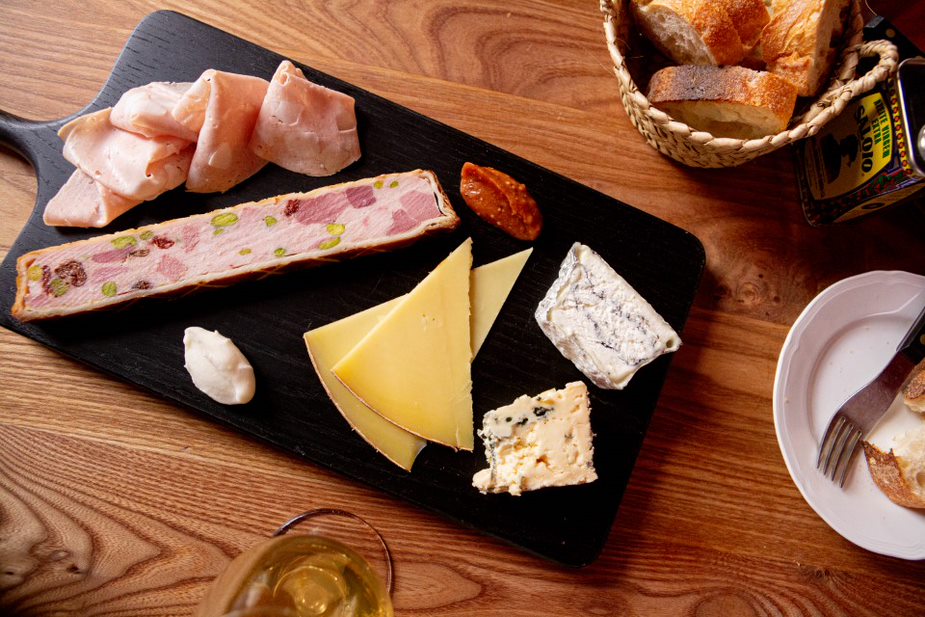Fresh off the high of earning a third Michelin star for Quince, a Jackson Square area restaurant featuring Californian contemporary cuisine, Matt Cirne and owners Michael and Lindsay Tusk knew they wanted to start something new.
Independently, the team reached a conclusion: They wanted to capture the essence of the wine bars of Paris and Europe – something that was casual, yet focused on creating delicious food, serving natural wine, and promoting social interaction.
“One thing I missed in American dining culture from England was the social element,” says Cirne, Verjus’ wine director and managing partner, who is originally from England.
After trips to Paris and an influential vacation to San Sebastian—a coastal resort town in Spain’s Basque country—Verjus, a European inspired wine bar was born.
Verjus’ atmosphere is unlike any known American dining experience; it’s more laid back and inherently social. Tables are usually arranged close together or communal, and tastings and samplings are available in the shopping area.
In America, Cirne explains, much of the service is based on formalities like linen napkins and reservation service, but many restaurants lack the social atmosphere of what’s known as a cave à manger in France – a wine bar, similar to a tapas bar in Spain, where customers can also order food and converse with friends.
Food and beverages complement each other abroad, but in America, there’s a disconnect, Cirne explains.
Americans prioritize the farm-to-table mindset when it comes to ingredients, but that doesn’t always follow through to the beverages, he adds. Cirne wanted to complement both, and also create a communal space accessible to wine connoisseurs or wine samplers stemming from all backgrounds and price points.
Wines from places such as Bordeaux or Napa are typically associated with luxury or wealth, Cirne explains. Verjus boasts an array of bright, light, fresh, boisterous and natural wines open to everyone.

“Wine is often associated with luxury or travel,” he says. ‘With natural wine it’s inherently social, there’s no barrier to entry.”
Natural wine is a concept used to describe wines without chemicals and additives, and the wines at Verjus come from distribution centers on the East Coast and California that specialize in this.
Many wines also come from local winemakers themselves and some wines ship from overseas. However, wine tariffs implemented in October, which put a hefty tariff on imported wines with an alcohol level below 14 percent, have affected Verjus, which specializes in the lighter variations.
“That’s been a bit of a blow,” Cirne admits.
Regardless, the mouthwatering food at Verjus complements the “bright, snappy, and direct,” wine offerings, Cirne explains. It features a heavily French-inspired menu with influences from the Spanish tapas culture. Think olives, anchovies and tortilla espanola mixed with the French bistro playbook. Cirne describes the menu as “recognizably french cuisine with a punch.”
Food at Verjus ranges from charcuterie boards to pâté en croûte made with ham, duck, cherry and pistachio, smoked pork sausage filled with cheese, and duck confit. The restaurant also offers an array of farm-to-table dishes like Jerusalem artichokes or morel mushrooms served with a poached egg yolk and garnished with seasonal ingredients like fava beans, depending on the time of year.

The hardest part amid the pandemic for a communal-focused restaurant created explicitly for social interactions, is learning how to adapt.
“There’s this natural inclination to sit at communal tables and interact with people you haven’t met before. That was the concept. We don’t want to abandon that, but doing that now is a challenge,” Cirne admits.
In addition to the restaurant, Verjus also features a brick-and-mortar retail wine store which has benefitted them during the shutdown. As many restaurants shuttered during the pandemic, Verjus wore many hats.
For about two months it functioned as a successful grocery store, offering produce from local vendors as well as wines, pantry provisions, and artisanal cheeses, Cirne says.
The restaurateurs later shut down to focus on their e-commerce business, to-go and delivery program, and their wine club Verjus Vivants, which offers natural wines in every price range to members on a monthly basis.
Only recently the restaurant has reopened to serve customers on the patio. They’re also offering a spread out farmers market on Fridays where customers can order boxes or stop by for some grilled sausages and wine tasting. However, they don’t want to encourage irresponsible interactions.
And, although the atmosphere is notably different from what it was before the pandemic, Cirne and his team are focused on offering new ways for customers to engage with the social space.
“Every city story with the pandemic is slightly different,” Cirne says. “In San Francisco we’ve seen varying degrees of apprehension from the public. We’ve tried to adapt to what the community wants.”






Can you be more specific about the content of your article? After reading it, I still have some doubts. Hope you can help me.
I don’t think the title of your article matches the content lol. Just kidding, mainly because I had some doubts after reading the article.
Your point of view caught my eye and was very interesting. Thanks. I have a question for you. https://accounts.binance.com/ar-BH/register?ref=JHQQKNKN
Thank you very much for sharing, I learned a lot from your article. Very cool. Thanks. nimabi
Your article helped me a lot, is there any more related content? Thanks! https://www.binance.com/ru/register?ref=S5H7X3LP
After reading your article, it reminded me of some things about gate io that I studied before. The content is similar to yours, but your thinking is very special, which gave me a different idea. Thank you. But I still have some questions I want to ask you, I will always pay attention. Thanks.